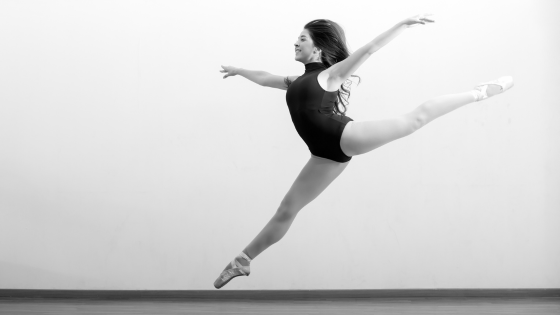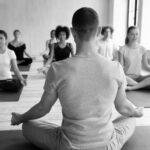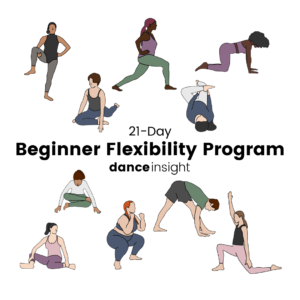
Your high school career counselor might be able to put you on the right track to become a doctor, accountant, or even a professional athlete, but they probably won’t be able to help you get a career in dance. They might even tell you that dance isn’t a real career, or advise you against pursuing your passion.
This can be discouraging to hear, but remember that your counselor probably knows very little about the performing arts industry. They think it isn’t a viable career path simply because they haven’t the faintest clue what opportunities that are out there or how you would go about pursuing them.
Well, Dance Insight is here to be your dance career counselor. If you’re considering a career in dance or anything adjacent to that, this blog is for you!
Note: This post is about how to get started as a dancer who performs for a living. There are many other ways to be a dance professional, from teaching to choreographing to dance therapy. That’s a topic for another post!
FAQs About Getting Started as a Professional Dancer
Do You Need to Start Young to be a Professional Dancer?
You do NOT need to start young to be a professional dancer.
Seriously.
I know you don’t believe me, so I’m going to shout it from the rooftops. YOU DO NOT NEED TO START YOUNG TO BE A PROFESSIONAL DANCER.
Reason #1: You can become just as good a dancer starting as a teen or adult as you would have if you had started as a kid. You just have to be able to put in the hours.
I think one of the reasons we don’t see as many dancers who started as adults rising to the top is simply because adults don’t tend to have the time and money required to train with that intensity. You might be able to take one class a week – which is great; it’ll get you to a solid intermediate level in a couple of years – but if your sights are set on Broadway or a dance company that goes on national tours, you’ll need lots of time and (unfortunately) money for training.
Reason #2: You don’t need to be as good at dance as you think in order to get performing jobs.
Some dance jobs have extremely high standards for technique and expect virtuosic ability as far as tricks and skills. (Think New York City Ballet) Others still want good, clean, technique, but they’re not going to ask you do do an aerial or 32 fouettes en pointe. (Think dancing in a musical or at a theme park.) If you broaden your idea of what a valid dance job is, you’ll find that there are indeed opportunities for those who aren’t world class technicians.
Do You Need to Go to College to be a Professional Dancer?
Nope! Whether or not you go to college, and what type of college you go to (in-person vs. online, 2-year vs. 4-year, etc.) shouldn’t hinder your dance career. You could start performing full-time at 18 and take online classes in your spare time (or not), you could go to a 2-year conservatory and really hone your craft before you start taking gigs, you could go to a 4-year university and study something non-dance-related while doing performing gigs during your summers… the possibilities are endless.
I’m going to write a whole post about the pros and cons of going to college if you want to be a professional dancer, so stay tuned for that if that’s a decision you’re making right now!
What Kind of Jobs Can Professional Dancers Have?
This is by no means an exhaustive list, just a sampling to show you how many opportunities there are out there! And again, remember that this post is focused on performing jobs. This list will quadruple once you start including choreography, teaching, and other dance professions.
- Cruise ship dancer
- Dancer in musicals or operas
- Theme park dancer
- Costume character performer (yes, there can be a lot of dancing involved in character work!)
- Background dancer in a movie or TV show
- Music video dancer
- Backup dancer for a music artist
- Dance team for a professional sports team
- Member of a dance company (this includes everything from professional ballet company to hip-hop troupe)
- Gig dancer for a production company (work various events, parades, and one-off shows that are put together by the company)
- Dancer at a hotel or resort
- Assistant teacher for conventions or masterclasses (I would consider this performing if the class is being recorded for publication, like CLI Studios classes)
These – and many more – are the kinds of jobs you can get as a professional dancer!
How Much Money Do Professional Dancers Make?
Not as much as they should, unfortunately, but it’s certainly not the lowest-paying job you could find. As of 2024 when this post is being written, I’d say you can expect around $15-$20/hr as a performer. The least I’ve been paid to dance was $10.50/hr (in 2018 – the same job pays about $14.50 now), and the most was $225/day for approximately a 6-hour day, so on average $37.5/hr (in 2023).

Tips for High Schoolers to Get Started as a Professional Dancer
So, you’re in high school and you’re considering a career in dance. You probably feel pressure to figure out the entire rest of your life right now and make major life decisions with minimal information. You’re probably afraid that you’ll make the wrong choice and set yourself up for failure. I know that’s how I felt at that time of my life.
The good news is, no career path – dance or otherwise – is completely linear. You can change your mind and start again a dozen times, and everything you learn along the way will help you in the next phase. If you remember one thing from this post, I want it to be this: you don’t need to figure everything out right now. The first step towards achieving your career goals is not to get paralyzed by decision-making.
As far as a dance career goes, there’s really only one major decision that has to be made right now, while you’re in high school: Do you want to be in a professional ballet company?
Why that question? Because ballet companies are extremely picky about age (unfairly in my opinion). Your best chance of getting into a professional ballet company is to go for it right after high school. That’s not to say it’s impossible to get into a company in your 20s or even 30s, but it would be much much harder. Most ballet companies won’t even let you audition if you’re over a certain age, usually 22-27. That’s not how it should be, but that’s how it is.
So, if the answer to “do you want to be in a professional ballet company?” is “yes,” then you’ve got your path laid out for you. Go to as many intensives as you can, and then in your senior year, go to as many auditions as you can. The Brainy Ballerina is an amazing resource for young dancers who are serious about ballet. Check her out if you think this might be the career path for you!
If the answer to “do you want to be in a professional ballet company?” is “no,” then you can relax a bit. Take time to try things out and figure out what other kinds of dance jobs you might be interested in.
If You Have a Few Summers Left
If you have a few summers left before you graduate high school, try out various intensives and experiences to get a feel for the “real world” of dance. The American Dance Festival has a youth program that will give you a taste of the kind of dancing you’ll do in college (also, having that under your belt will look amazing on college applications). Broadway Dance Center’s Junior Training Program is great for those interested in jazz, contemporary, and musical theater. Try out a ballet intensive if you’re on the fence about pursuing professional ballet. Central Pennsylvania Youth Ballet has a 2-week program that doesn’t require an audition and is a great first ballet intensive.
You could even spend one of your high school summers working your first professional dance job! If there’s a theme park within driving distance of you, start looking for their auditions. Most theme parks hire as young as 16. Now, you probably won’t be put in one of their mainstage shows because of your age, but you might be a background/hype-up dancer, a costume character, an atmosphere actor, or something else in the entertainment department. What better way to decide if a performing career is for you than to get a summer job as a performer?
If You’re a Senior
If you’re a senior in high school, your big question right now is whether to go to college, and what you want that to look like if you do. Here are a few important questions to ask yourself:
- Do I need financial aid to go to college?
- Financial aid is much easier to come by when you go straight from high school to college, so if you can’t pay for a degree without financial aid, you probably want to take advantage of whatever aid you can get and get your degree now.
- Are there any non-dance careers that I’m interested in pursuing?
- It’s possible to pursue multiple things simultaneously. Consider double-majoring, or getting a degree in your non-dance field and minoring in dance. If this is you, I recommend auditioning for some college dance programs, even if you haven’t fully decided yet. Keep that option on the table.
- Do I think I could earn a degree online?
- Some people don’t learn well online, so if that’s you, ignore this option. I know a lot of people who perform full-time while taking online college classes part-time. You could take a gig anywhere and still be able to complete your coursework in your spare time. This is a good option if you want to start your performing career right away, but you also want to get a degree.

Tips for College Students to Get Started as a Professional Dancer
If You’re a Dance Major
The best way to get a head start on your dance career while you’re still in college is to get summer jobs. Other majors have summer internships, you have a summer being in a musical at a dinner theater or a parade at a theme park. There’s no better way to prepare yourself for the “real world” than to dip your toes in it while you’re still training. Even if you audition for summer jobs and don’t get anything, you’re still learning valuable information about the audition process.
I also recommend taking advantage of all the resources available to you at your college while you have them.
- Use your college’s dance studio to get lots of video footage of you dancing, and use the video editing software in the media lab to create a reel. Once you graduate, you’ll have to pay to rent space at a dance studio, and you’ll have to learn how to edit video on your own, or pay someone to do it for you.
- Choreograph something on your fellow students and get video of it. Even if it’s not for an official showcase, get footage of your choreography. After graduation, it’ll take a lot more effort to get people together to learn a whole piece, not to mention paying for studio space to rehearse in.
- Audition for every performance opportunity your college offers. I never auditioned for my college’s premiere performing company because I was involved in a lot of other activities (like teaching at a local studio) that would have conflicted. I regret that now, because I probably could have made it work, and I would have had so many more opportunities.
- Keep a resume-like list of everything you did as part of your dance program. If you choreograph a piece, write down the title, number of dancers, names of the dancers, music info, when and where it was performed, and a brief description of the theme. Write down the names of everyone you take a masterclass with. Write it all down because you will forget by the time you want to put that info on a resume. You’re getting a lot of valuable experience with this degree. Make sure you can include it on your resume!
If You’re Not a Dance Major
First of all, if you’re considering dancing full-time, but you’re currently in college studying something else, I don’t recommend dropping out of college unless you really don’t like what you’re currently studying. Having a degree in something non-dance-related could really help you down the road, so I recommend finishing your degree if you can. Think outside the box if you have to. Maybe you can switch to an online program, or take a year off to get a dance contract under your belt and then go back to school. There are plenty of ways to make progress in your dance career while getting a degree.
How to improve your dancing while in college:
- Take dance classes at your college if they’re offered, and if non-majors are allowed to take them (ask about auditing the class if you’re worried about taking too many credits)
- Add a dance minor if it’s available
- Take classes at a local dance studio
- Take private lessons, either with a local teacher or online
- Take online dance classes (if you teach at a local studio, they’ll usually let you use the space for free)
- Join a dance club if your school has one
How to get started as a professional dancer while in college:
- Audition for as many things as you can, even if you know you won’t be able to do the gig because of your schedule. Start getting a feel for the audition process.
- Take summer dance jobs (companies are usually understanding of students needing to miss a rehearsal or leave the contract a little early because of their school schedule)
- Look for local dance companies (paid or unpaid) that rehearse in the evenings or on weekends
- If you’re interested in musical theater, get involved in a community theater

Tips for Adults Switching Careers
Switching to dance from another career isn’t something I’ve done personally, but I’ll give you my advice based on what I’ve heard from colleagues who’ve done it.
One of the hardest parts of a performing career is getting consistent work that pays the bills, especially when you’re first getting started. You might work a 6-month contract, a month off, a 3 month contract where you’re only working three days a week, and so on. For this reason, I don’t recommend completely quitting all other work.
How to get started as a professional dancer when you’re switching careers depends on your current job situation, but for the sake of example let’s say you’re currently working a 9-5.
If you don’t have many years of dance experience, or it’s been a long time, spend at least a couple months going to dance classes to get back into it before you start auditioning. I suggest this because you’ll probably need to use your vacation time at work to go to auditions, and you want to have the best shot possible at each audition because your vacation time will be limited.
Then, film a video of yourself dancing to use as your first reel. A dance reel doesn’t need to be performance footage. I’ve had the most success getting jobs when I just sent a video of me dancing in a studio.
Submit to as many auditions as you can, either online or in person. Travel may be required to audition in person, but it’s worth it if you can make it happen. Check out my post How to Find Dance Auditions if you need help there!
Once you book your first gig, assess what you need to do about your day job. Can you drop down from full time to part time? Can you switch to working from home and have flexibility with your hours? Can you take a leave of absence? Keep your salary in mind here, too. It may be that it’s not worth quitting your day job until you find a dance job that pays a certain amount or gives a certain amount of hours.
If it turns out the only way to take the dance gig is to quit your day job, and you feel like it’s the right time, go for it. Then use the time that you’re on the dance contract to find a side hustle that will help pay the bills if you don’t get another contract right away. See Side Hustle Ideas for Performing Artists for ideas!
Learn More
I want to wrap up with a collection of related posts that will help you get started as a professional dancer. I hope this post was helpful and wish you the best of luck on your dance career! Follow @danceinsightblog on Instagram or Pinterest for more tips and to hear when we publish new posts!
Auditions
- How to Find Dance Auditions
- 10 Minute Dance Warmup for Auditions
- 8 Tips for Picking Up Choreography Quickly
Pro Dancer Life
- Side Hustle Ideas for Performing Artists
- 7 Things I Learned in My First Month of Dancing Professionally
- 10 Things Pro Dancers Should Do Before Moving to a New City
- 8 Reasons to Keep Taking Class as a Dance Professional
- Do You Need a Website as a Professional Dancer?
College







